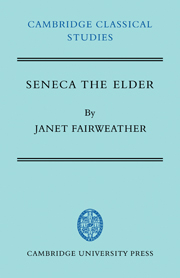Book contents
- Frontmatter
- Contents
- Preface
- Abbreviations
- PART I THE PLACE OF SENECA THE ELDER IN LITERARY HISTORY
- 1 Seneca the Elder: a man of his time
- 2 The declamatory anthology
- 3 The criticism
- PART II SENECA THE ELDER ON THE HISTORY OF ELOQUENCE
- PART III FIVE ASPECTS OF DECLAMATION: THE ELDER SENECA'S EVIDENCE
- PART IV THE PLACE OF EARLY IMPERIAL DECLAMATION IN LITERARY HISTORY: THE ELDER SENECA'S EVIDENCE
- Indexes
- Frontmatter
- Contents
- Preface
- Abbreviations
- PART I THE PLACE OF SENECA THE ELDER IN LITERARY HISTORY
- 1 Seneca the Elder: a man of his time
- 2 The declamatory anthology
- 3 The criticism
- PART II SENECA THE ELDER ON THE HISTORY OF ELOQUENCE
- PART III FIVE ASPECTS OF DECLAMATION: THE ELDER SENECA'S EVIDENCE
- PART IV THE PLACE OF EARLY IMPERIAL DECLAMATION IN LITERARY HISTORY: THE ELDER SENECA'S EVIDENCE
- Indexes
Summary
The chief glories of Seneca's criticism are the pen-portraits, mainly to be found in the prefaces. These remarkable psychological and critical descriptions have been more often imitated than discussed. Fine imitations of his manner were produced in this country particularly in the seventeenth century, when English prose had an incisiveness and luminosity strangely akin to Seneca's, and hard to recapture now. Following the example of Montaigne who, for instance in his essay Du parler prompt ou tardif, had looked to the elder Seneca for reflections from which morals could be drawn –
On recite de Severus Cassius, qu'il disoit mieux sans y avoir pensé; qu'il devoit plus à la fortune qu'à sa diligence; qu'il luy venoit à profit d'estre troublé en parlant, et que ses adversaires craignoyent de le picquer, de peur que la colere ne luy fit redoubler son eloquence.
(Cf. Contr. III pr. 6) –English essayists took to adapting Seneca's anecdotes. Here is Abraham Cowley imitating Suas. 2.17 in his essay On greatness:
… he would eat nothing but what was great, nor touch any Fruit but Horse-plums and Pound-pears. He kept a concubine that was a very Gyantess, and made her walk, too, alwaies in chiopins, till at last, he got the surname of Senecio Grandio, which, as Messala said, was not his Cognomen, but his Cognomentum.
- Type
- Chapter
- Information
- Seneca the Elder , pp. 50 - 74Publisher: Cambridge University PressPrint publication year: 1981



